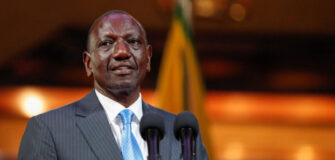Youth triggered overdue talk on the state of nationhood
Share
The Gen Z protests going on in Kenya are paradigm-shifting. Who would have thought that it would take young adults, most barely in their early twenties, holding water bottles, phones and Kenyan flags, to remind us of the social contract between citizens and the state?!
They also forced an examination of the roles our political culture and various institutions such as Parliament, Judiciary and Church play in normalising an abnormal state of national affairs.
Further, they exposed the corruption and warped priorities of the government. Also, they showed the moral decadence of the political class.
Finally, they made us all look at ourselves and realise how our world view and behaviour have contributed to the creation of a state that was an end in itself; in other words, a state that existed in order to sustain itself.
We knew the youth bulge was either going to be a boon or a threat. With thousands of youth leaving school every year to join the ranks of the underemployed or unemployed, the government faced a task so Herculean that only an overhaul of our governance culture, a reorganisation of our priorities, and an absolute change of behaviour would avert the threat of the youth bulge and, instead, convert it into an advantage.
Yet what the government offered was more of the same redundant policies, the same brand of money-crazed people to run key departments, the same wastage and mismanagement, the same negligence, and the same platitudes, bolstered by the International Monetary Fund and World Bank statistics, to help hide the fact of deeply flawed governance. Statics indicating economic growth rate when the population growth rate is way higher are just a sleight of hand to hide a broken system.
The youth have issued their non-negotiable demands: Scrapping of the unfilled illegal positions of Chief Administrative Secretary, created to reward sycophants of the regime; scrapping of the money-gobbling offices of the First, Second and Third Lady, and God knows what other ladies; firing of Cabinet secretaries with integrity issues; arrest and arraignment of corrupt officials, many of whom have been appointed to various key positions; halt to the decadent opulence of officials, at taxpayers’ expense, the righting of priorities, so that funding important programmes takes precedence over expenditure on renovation of State House and the deputy president’s residence.
The youth, highly distrustful of William Ruto, have declined meeting with him, saying he knew their demands and he should act on them.
The youth have also demanded the church stop laundering morally dirty politicians in exchange for monetary handouts. They intend to hold a thieving regime accountable by exposing every financially and morally corrupt official.
Kenya will never be the same again, whether the corrupt and somnolent Ruto-Gachagua government addresses their demands or not.
They have revived activism for good governance and accountability, and in so doing, ushered in a long-overdue national conversation about the state of our nationhood.


